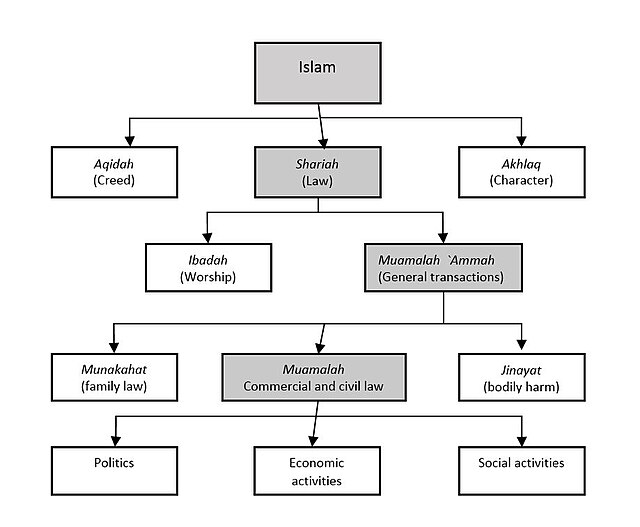Top Qs
Timeline
Chat
Perspective
Mu'amalat
Part of Islamic jurisprudence From Wikipedia, the free encyclopedia
Remove ads
Muamalat (also muʿāmalāt, Arabic: معاملات, literally "transactions"[1] or "dealings")[2] is a part of Islamic jurisprudence, or fiqh. Muamalat has been defined as Islamic "rulings governing commercial transactions",[Note 1][Note 2] but also more broadly to include civil acts and in general all aspects of fiqh that are not Ibadat, i.e. not acts of ritual worship such as prayer or fasting,[Note 3][Note 4] (See organizational chart of the structure of Islam below in "Principles" section.)[7][8]
Mu'amalat provides much of the basis for Islamic economics, and the instruments of Islamic financing, and deals not only with Islamic legality but also social and economic repercussions and the rationale of its prohibitions (according to Monzer Kahf).[9] Even a broad definition of Muamalat does not deal with all aspects of property and money in Islam, as zakat — compulsory alms giving that is one of the five pillars of Islam — is part of Ibadat division of fiqh.
Remove ads
Definitions
Summarize
Perspective
- commercial and civil acts or dealings under Islamic law, (Oxford Islamic Studies Online);[2]
- what involves acts of interaction and exchange of sureties and sales (Oxford Dictionary of Islam);[10]
- “the knowledge of Shariah rulings that relates to the practical aspects of a mukallaf (an accountable Muslim, i.e. an adult and mentally competent) in the area of business and financial dealings and derived from its detailed evidences.” (Abdullaah Jalil, Asharaf Mohd Ramli, Syahidawati Shahwan. Based on the definition of fiqh established by the founder of the Shafi'i school of fiqh, Al-Shafi‘i (204 AH))[11]
- all engagements that take place in business, ("corporate sharia elite" according to Patricia Sloane-White);[12]
- Islamic jurisprudence of transactions, and the principles upon which Islamic finance is based (M.R. Ab`Aziz);[13] also the study of "the legal framework within which economic transactions are conducted in an Islamic society" and that "determines their contracts" (Monzer Kahf);[14]
- that aspect of Islamic jurisprudence that deals with civil obligations, (Jamal J. Nasir);[15]
- "any form of mutual dealings held between men to solve their everyday needs, especially in matters relating to trade and commerce"; also "a social relationship which consists of various economic and non-economic activities." (Takaful Basic Examination of Islamic Banking and Finance Institute of Malaysia).[1]
According to at least one author (Monzer Kahf), Mu'amalat "sets terms and conditions of conduct for economic and financial relationships in the Islamic economy" and provides the "grounds on which new instruments" of Islamic financing are developed. It also extends beyond discussions of Islamic legality "to the social and economic repercussions of alternative legal forms of economic or financial relationship and analyze the rationale behinds [sic] it."[9]
Remove ads
Principles
Summarize
Perspective

According to Hosein Askar, Zamir Iqbal, and Abbas Mirakhor, a "significant subset" of muamalat "defines the conduct of economic activities" within the economic system, which "ultimately lays down the rules for commercial, financial and banking system."[16]
Basic principles
According to Aznan Hasan, basic principles of muamalat, are that dealings and contracts in Islam ...[17]
Theories of Muamalat
According to Abdullaah Jalil, Asharaf Mohd Ramli, Syahidawati Shahwan there are four "theories" that underlie the framework of Mu'amalat dealings:[18]
- Ahliyyah (Legal Capacity). Legal capacity refers to whether the person is of sound mind and old enough (puberty) to enter into a legal financial contract.[18]
- Mal (Property) concerns the nature and types of property that the contract deal with.[18]
- Property must exist at the time of transaction
- seller must be owner of the merchandise
- merchandise must be Islamically lawful
- must be of some use or value
- must be able to be delivered by the seller to the buyer
- the details of the merchandise must be known to both the seller and buyer[19]
- Milkiyyah (Ownership), concerns the types, methods and scopes of ownership, that affect the relationship between the property and its owner in Islamic jurisprudence.[18]
- 'Aqd (Contract), describes the framework or structure of a contract in fiqh.[18]
Authors Jalil, Ramli and Shahwan also list differences between Mu'amalat and 'Ibadat."[20]
}
General Prohibitions
According to muamalat, contracts ...
- should not involve the selling or buying of alcohol or any other haram substances.[21][22]
- should not include any financial deal on the basis of usury (riba)[22][21]
- should not involve gambling (maisir)[22][21]
- should not involve major uncertainty (gharar fahish)[22][21] (minor uncertainty is permissible).
Contracts
At least one source (a scholar identified as "Barbarti") defines aqad (contract) as a “legal relationship created by the conjunction of two declarations, from which flow legal consequences with regard to the subject matter”. [23]
The essential elements of a contract are contracting parties (aqidan'), a subject matter ('Ma'aqud Alaih), and a legally binding offer and acceptance (sighah). They may be written, verbal or even indicated by signs (in the case of speechless person).[24]
Muamalat contracts are prominent in Islamic banking where they are "fundamental factors" that determine whether a "transaction is valid or not".[25]
Some contracts in Mu'amalat include:
- Sale Contract;
- Cost plus profit (murabahah);
- Debt (al-Qard);
- Hiring/leasing (al-Ijarah);
- Lending (al-I'arah);
- Agency (wakalah);
- Mortgage (al-Rahn);
- Partnership (Musharakah);
- Profit Sharing (Mudarabah).[26]
Remove ads
References
Wikiwand - on
Seamless Wikipedia browsing. On steroids.
Remove ads